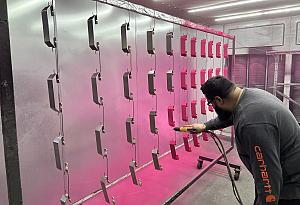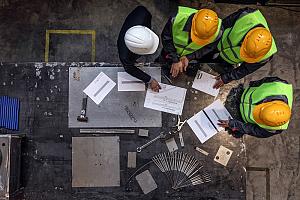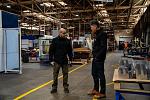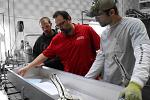- FMA
- The Fabricator
- FABTECH
- Canadian Metalworking
Categories
- Additive Manufacturing
- Aluminum Welding
- Arc Welding
- Assembly and Joining
- Automation and Robotics
- Bending and Forming
- Consumables
- Cutting and Weld Prep
- Electric Vehicles
- En Español
- Finishing
- Hydroforming
- Laser Cutting
- Laser Welding
- Machining
- Manufacturing Software
- Materials Handling
- Metals/Materials
- Oxyfuel Cutting
- Plasma Cutting
- Power Tools
- Punching and Other Holemaking
- Roll Forming
- Safety
- Sawing
- Shearing
- Shop Management
- Testing and Measuring
- Tube and Pipe Fabrication
- Tube and Pipe Production
- Waterjet Cutting
Industry Directory
Webcasts
Podcasts
FAB 40
Advertise
Subscribe
Account Login
Search
Red Bud celebrates 50th anniversary
- July 13, 2009
- News Release
- Shop Management
Red Bud, Ill.-based Red Bud Industries, a manufacturer of coil processing lines, is celebrating its 50th anniversary this year.
In 1959, Ken Voges, just 23 years old, sold his 1955 T-Bird to start his own machine shop in a small building on his parent's farm near Red Bud, Ill. His teenage work experience in machine shops filled him with ideas to use in his own venture, known at that time as ABC Metal Products. Voges' parents and wife helped in the business and provided the moral support needed to get the company up and running.
The company began by serving area farmers with their machining needs and within two years had moved into building tools and dies for manufacturers of heaters, washers and dryers, and commercial staplers. In the company's early days, projects sometimes were taken on to maintain steady work and keep workers employed. At times, some of these projects appeared to be above the company's design and fabrication capabilities, but each proved to be successful and prepared the workers for more challenging tasks.
Some of the first major projects included building progressive dies, particularly a burner die for the manufacturing of furnaces, automated transfer units for old dies, and coil lines used in the manufacturing of transformers. These coil lines were the earliest venture into the engineering and design of the company's present product. Around that same time, a 12-in. (30-cm) automatic shear was designed and built, further laying the foundation for today's product.
While these early projects were successful, the company needed a product that was more than a one-time project that could offer more stability to the work force of 15 people. In time, Voges' brother, Bob, asked him where he would be able to purchase an accurate and reliable feed to transfer steel to presses. Ken felt this was just the type of project for his young company, and a new Red Bud product line gradually evolved.
In 1964, the company moved to a manufacturing space in the town of Red Bud. However, the company quickly outgrew that location, and plans were made to construct a new home for the company on the outskirts of town. In 1971, the company moved into its current location, at that time a 25,000 square foot (2,323 square meter) facility. Around the same time, it expanded its product line to include cut-to-length equipment.
On August 21, 1973, Red Bud Industries was granted its first patent for its Grip Feed Measuring System. It began using computers in its operation in 1978.
During the mid 1980s, the company began offering toll processing services to its customers and other service centers as a method to test new machines. This venture proved to be quite successful, and in late 1992, the toll processing business was spun off into its own entity now known as The Material Works, Ltd.
Beginning in the late 80s and continuing to the present, the company has introduced many products, including multiblanking, programmable knife positioning, and dual action grip feed systems. A patented slitter mounted stress reduction pinch roll system was introduced in 1998. During this time, the company also developed its patented in-line stretcher leveler.
In 2000, the company installed its first coil-to-coil slitter. It also developed its first -in. (6.35-mm) and -in. (12.7-mm) stretcher levelers.
The company launched RBI Tech Support, Inc. in 2001 to provide installation, startup, training, maintenance, and repair services for Coil Processing Machinery.
The original 25,000 square foot (2,323 square meters) building has been expanded three times since 1971. The building was doubled in size in 1986 and again in 2000. The 2000 expansion included an office that hosts customers from around the globe. In the summer of 2008, the manufacturing facility was doubled once again to its current size of 200,000 square feet (18,581 square meters). Part of the recent expansion included several new CNC machining centers capable of operating unattended throughout the night and weekends and additions to the capabilities of the existing automatic CNC machining centers.
The company currently employs more than 150 people and has more than 1,000 installations worldwide.
Related Companies
subscribe now

The Fabricator is North America's leading magazine for the metal forming and fabricating industry. The magazine delivers the news, technical articles, and case histories that enable fabricators to do their jobs more efficiently. The Fabricator has served the industry since 1970.
start your free subscription- Stay connected from anywhere

Easily access valuable industry resources now with full access to the digital edition of The Fabricator.

Easily access valuable industry resources now with full access to the digital edition of The Welder.

Easily access valuable industry resources now with full access to the digital edition of The Tube and Pipe Journal.
- Podcasting
- Podcast:
- The Fabricator Podcast
- Published:
- 04/16/2024
- Running Time:
- 63:29
In this episode of The Fabricator Podcast, Caleb Chamberlain, co-founder and CEO of OSH Cut, discusses his company’s...
- Industry Events
16th Annual Safety Conference
- April 30 - May 1, 2024
- Elgin,
Pipe and Tube Conference
- May 21 - 22, 2024
- Omaha, NE
World-Class Roll Forming Workshop
- June 5 - 6, 2024
- Louisville, KY
Advanced Laser Application Workshop
- June 25 - 27, 2024
- Novi, MI






























